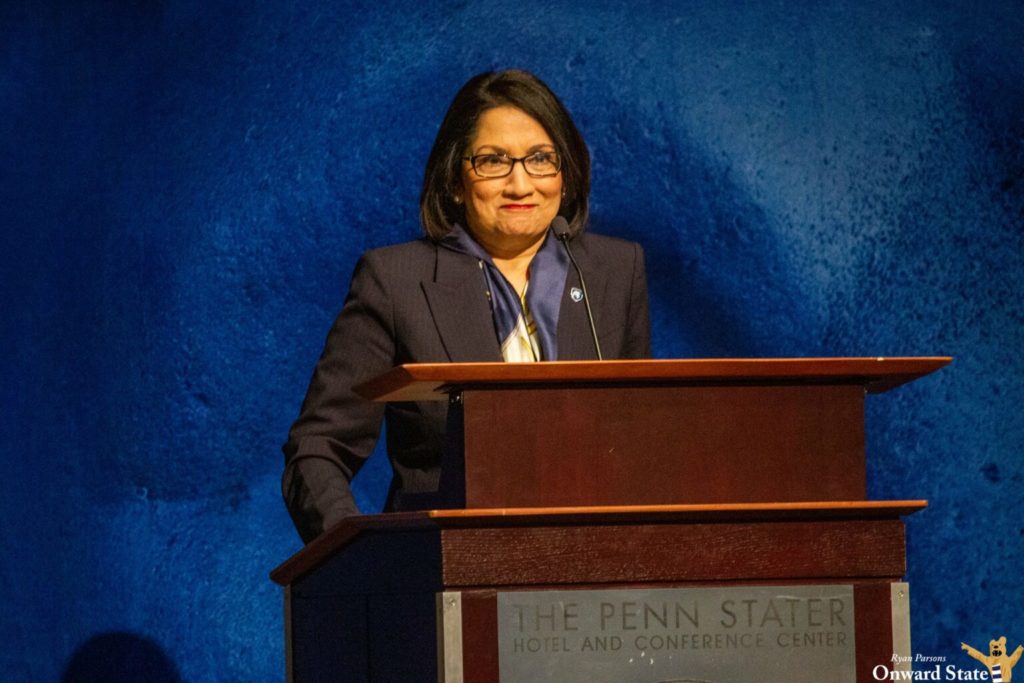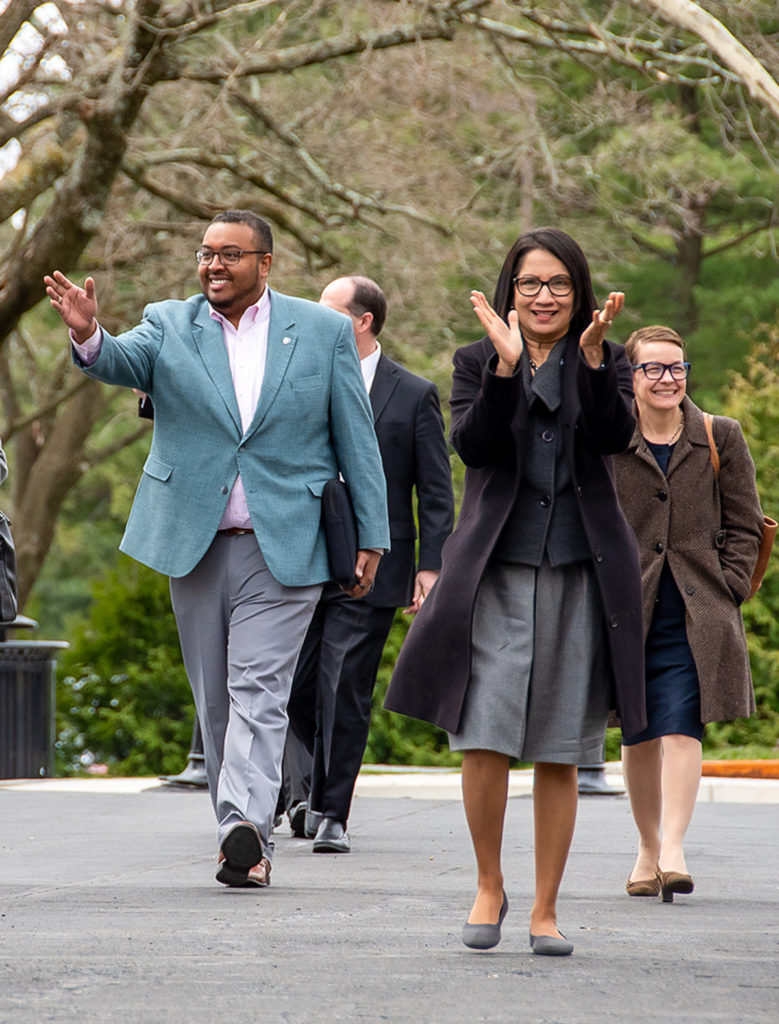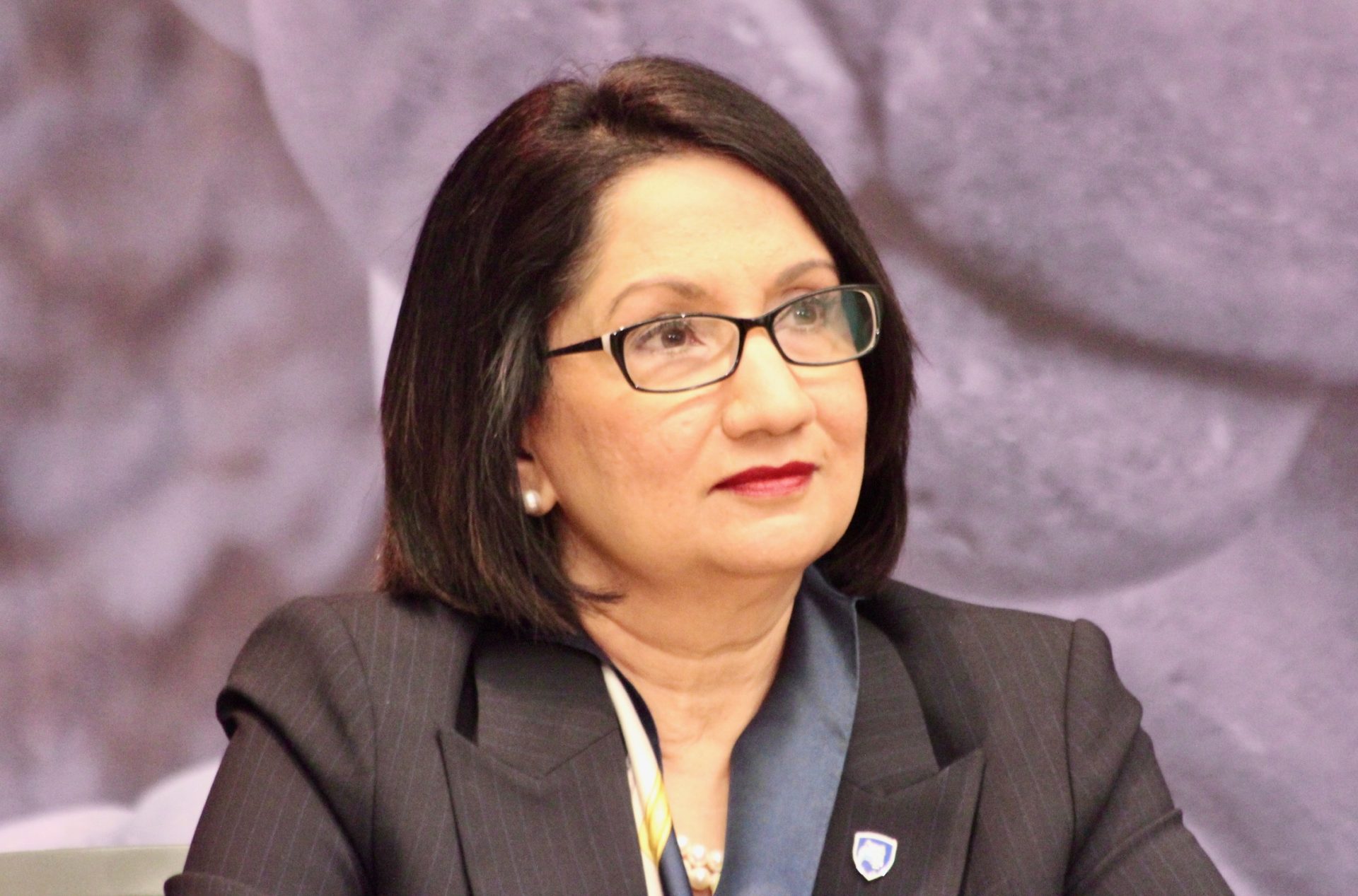Neeli Bendapudi has only been president of Penn State for a few weeks, but her work started long before she officially moved into her office on the second floor of Old Main.
Appointed as Penn State’s 19th president by the Board of Trustees in December following three years at the University of Louisville, Bendapudi began a transitionary period in March. She’s visited the Commonwealth Campuses, and met with academic and administrative leaders, students, donors, community leaders and legislators.
She even made two key hires before officially succeeding Eric Barron at the helm of a university with 90,000 students, 34,000 employees, 24 campuses and a $7.8 billion budget. The announcement of her chief of staff, Michael Wade Smith, who follows her from Louisville, was made immediately after her own hiring. And on April 29, current Boston College Athletic Director Patrick Kraft was named Penn State’s next vice president for Intercollegiate Athletics, succeeding the retiring Sandy Barbour on July 1.
StateCollege.com editor Geoff Rushton spoke with Bendapudi on Thursday morning about her first days in office, what she’s learned about the university, the challenges the school faces, her priorities, acclimating to State College and more — like the ongoing quest to pick a favorite Berkey Creamery ice cream flavor.
Following is their Q&A, lightly edited for length and clarity.
You’ve obviously been busy since the start of the year but you just officially took office on May 9. What have you been doing these past two weeks or so?
Neeli Bendapudi: I came here kind of mid-March, so I had about seven weeks of the transition time and I used that to go travel to all of the Commonwealth Campuses. I thought this would be a wonderful way to learn the breadth and depth of Penn State connections across the commonwealth.
These past two weeks have been about trying to meet different key constituencies. I’ve really enjoyed having a meeting with the mayor [Ezra Nanes] and our State College Borough, some of the representatives, traveling to meet our donors, the significant stakeholders. I’ve met with our faculty, staff and student representatives… trying to get a lay of the land as much as possible.
As you mentioned, I know you’ve been spending a lot of time with academic and administrative leadership and visiting the campuses. Has there been anything you’ve learned about Penn State that has surprised you?
NB: I grasped intellectually how with all of our campuses we impact all of the commonwealth but I think actually being there…Certainly the research we do, how it impacts the entire world, I knew. That’s something from the outside you see and you get. But the thing that probably was the biggest surprise is part of our land-grant mission, which is social mobility and economic development and research that impacts the world and has immediate impact. That’s part of our land-grant roots. But seeing all the Commonwealth Campuses, one of the big surprises was if you see one Commonwealth Campus, you’ve only seen one. Each of them is so different and how they are trying to be nimble and how they are trying to respond to local needs, how vital Penn State is for the whole economy of the commonwealth. I don’t know if it’s a surprise but it’s like, wow, I knew it here [points to her head] but now I get it here [points to her heart].

How has your acclimation to State College been going and what is your impression of the Centre Region? Is there anything that stands out.
NB: Oh, it is spectacular. This is overall just such a beautiful, beautiful state. No offense to any place I’ve been but my husband says — let’s put it on my husband [laughs] — Venkat does say, “Neeli, this is the most beautiful state we’ve ever lived in.” Kentucky is gorgeous. Ohio, Kansas, everywhere is great, but we are really inspired by how gorgeous it is… It’s beautiful. The people have been very warm, very welcoming. And I don’t think it’s because I’m the president. Like you watch how people are reacting to one another, that’s been wonderful.
Yesterday I went to a picnic that we had for our physical plant personnel. There’s so many of them and they worked so hard during the pandemic. They were the essential workers who needed to show up to make sure everything was going. I loved seeing how many of them would say, “I’m here and that’s my cousin. My dad worked here, my nephew.” That’s really lovely to see.
And your family? I understand your daughter and son-in-law and grandson are moving here as well.
NB: They’ve moved. They’re here! I love it. I’m so grateful because we just have the one child. You know my story, our story. We worked so hard to come thousands of miles away from family to come and make a better life and this is the only country in the world where that would have been possible — for me; that’s my story. For me, that’s my reality. So to be in a position now where our daughter and son-in-law are close by means a lot to us. They’re enjoying it very much.
Penn State plays a very central role in the economic, cultural and even the political life of this community, as well as statewide. And I know you’ve talked in the past about being a presence in the community. In general, what’s your philosophy on your role as Penn State president in the town-gown relationship?
NB: I really think it’s vital. That’s true for all institutions of higher education anymore, first of all. I don’t think we can really sit in our ivory towers and issue lofty opinions and have nothing to say to anyone. For us at Penn State, we are the only land-grant university in the commonwealth. So a land-grant university has even more… When I think about who we are and what we do — whether we’re individuals, whether we’re a team, whether we’re a company, whether we’re an institution — we need to think about what is our mission. What are we supposed to do? And so for a land-grant university, the whole idea of the land-grant, going back to Lincoln and Morrill, is the idea that you make a difference for the citizens right here. That is the whole purpose. I’ve lived in college towns and love it. It brings it home even more that all the good that comes from Penn State, because that’s what we’re supposed to be doing, has to be felt by the citizens of State College, the commonwealth, the country and beyond. We have global aspirations. But if we’re not actively helping our neighbors, we’re failing in the land-grant mission.
From what you’ve learned so far and your overall expertise in higher education, what are the biggest challenges facing Penn State right now?
NB: There are so many. I love how you framed it because some of them are common to all institutions of higher education. You think about overall, how do we communicate the value proposition of higher education? I think that a decade ago, two decades ago, three decades ago, there were always questions about what does higher education do, but I think that it’s incumbent upon us not to just assume that everyone gets it but to be able to say what are the benefits of higher education, why should we invest in higher education. I’m not pointing fingers at anyone because these are tough choices. Where do we invest? But to be able to say what does higher education do.
We’ve also seen that in higher education the pandemic showed us that there is still a very strong appetite for students and faculty to want that face-to-face interaction. It’s not just all the Zoom where it happens. You want to be here. So what is the value that we’re providing to students when they are here? What are we doing beyond just transmitting some information? I talk about it as … the knowing, being and doing. So institutions of higher education, what are we doing so people know more when they are here? What is it they learn to do when they are here? But even more fundamentally, how have they transformed as individuals? How are we contributing to better citizens, better neighbors, better parents, better humans? Those are some things we need to talk about.
So for me, sustainability of our financial model is a big thing, both for the university and the student. How do we make sure the access and affordability mission that are part and parcel of the land grant, how do we do that at a time when maybe state support is not at a historic high? How do we compete as the commonwealth? How do I get people to see that investing in Penn State is the right thing for the commonwealth?
Have you had a chance to speak with any legislators since you started?
NB: Yeah, I’ve had a chance to meet with a couple and I’m looking forward to meeting with several more… We are setting up something in June where it’s a chance for me to be in Harrisburg.
What’s in store for you this summer?
NB: I’ve been listening. That’s the first thing you need to do: listening a lot. But this will be a time for me to be able to sit down with key members of the team and talk about what we want to have accomplished in year one. Time goes by so fast. What do they say? Days are long but the years are short. I like to think about, as a team, what do we want to get done? We certainly have a longer term vision and keep building. Number one is I want us to really stay focused on student success. … I’ve been thinking of the challenge for higher education is the students who come and then drop out without finishing. If you look at college debt, the biggest group that suffers is the students that have some college and no degree. That’s the worst of all possible worlds. You’ve incurred debt and you have no way to pay it. So it’s bad for them; it’s bad for the university; it’s bad for society.
I think this summer I really want to focus on what I’m calling the ABCs. This will be more internal to our faculty and staff. For every single student, are we creating academic preparedness? Are we preparing them not just for the class that comes next but for a good job, a good career? Are we creating a sense of belonging for every single student who comes through our doors? And what are we doing to contain costs? So I’m hoping this summer that will be one of the first things we take up, to learn what we are doing in all three areas. And it’s not that we are not doing a good job, but as you know, you can never be complacent. There’s always more we could be doing.

When you started officially as president after having some time to get the lay of the land and talk with so many people, have you thought “OK, these are my priorities for the short term; these are my priorities for the long term?” And what would some of those be?
NB: Broadly speaking, student success and student engagement, that has to be number one, naturally.
I’m very, very interested in how do we recruit, retain our best faculty and staff. I want everyone to come to State College and see how amazing it is when we recruit. That’s been my experience, but how do we bring people here and how do we keep them once they’re here? Providing them those opportunities, that’s going to be key.
I am very focused on our Commonwealth Campuses. I don’t think people get it, that now you can get a four-year degree at every single one of our Commonwealth Campuses. It’s no longer just 2+2. How do we really support all of them?
A fourth area of interest to me is our medical enterprise. With Hershey and with the College of Medicine, I see so much that we can do.
And I would say the final one will be what we started with. How do I make sure that everyone understands the role that Penn State can and should play in the thriving of the commonwealth? So maybe five broad areas that I will be focusing on.
As far as I know anyway, you’ve made two hires: your chief of staff, Michael Wade Smith, and your athletic director, Patrick Kraft. I know you said you weren’t expecting to be hiring an athletic director right away. Pat Kraft was hired pretty expeditiously, I think. Why was it important for you to get that position settled as quickly as it was?
NB: Increasingly, if you look at what’s happening in the marketplace, that is a very key role. Whether it’s student engagement, whether it’s the economic impact of Penn State — how many people come up and say “We’re looking forward to football because my little store gets so many more people who visit.” It’s not just that. It’s the 31 sports that we have. These athletes, every one of those teams wants the leadership to do what they need to do. I knew it was a very critical hire and wanted to get someone in place so that we can have a very smooth transition. We’ve had Sandy Barbour do so much and do such a great job, I thought if we could bring someone onboard quickly they’d have that little bit of overlap, transfer of institutional knowledge and hit the ground running. The other part for me is with these high-profile hires, the leaks and the speculation. Who is it? We just need to be nimble. That’s the way the world is moving. I knew the characteristics I was looking for and after great advice from the key constituencies, I thought if we find the right person why not act quickly.

It certainly seemed like your hiring as president was frictionless in that even the kind of most vocal and critical members of the board have spoken very positively of you. How would you characterize your relationship with the Board of Trustees?
NB: I am so thankful to each and every one of them. One of the things is that every single one of them that’s on the board, whatever their positions, whether they agree on everything or not, they all love Penn State. They are not doing it because they need a line on their resume. These are all highly accomplished individuals. And so I take that to heart. All I can do is make sure that in everything I do that they know I am making what I truly believe is in the best interest of the university. If we stay focused on why we exist, take away the trappings, we are here to create better futures for these young people that come to us. Young and young at heart. Nowadays when we talk about students it’s a whole spectrum. I will never forget that Penn State is here to harness the power of higher education to transform lives for the better. I think that’s something every board member agrees on. I’ve really been gratified and I’m thankful to them for their support.
I’m sure you’ve had a lot of conversations with Eric Barron. What were some of the key lessons that he was able to impart to you about this job.
NB: He gave me a very good sense of the breadth of the university, the complexities, and good advice about pacing yourself. You know, this is a marathon not a sprint. I’m very thankful for his graciousness.

One of the things that was a major priority for him were the economic development, innovation and entrepreneurship initiatives. Are those things you want to build on going forward.
NB: One hundred percent. If you know my background, I’m a recovering banker. I’m a proud businessperson. And again, the reason I support it wholeheartedly is because it’s consistent with our mission. That’s how I do it. I come back to, what is it we’re supposed to do? We’re supposed to be about social mobility for all of our citizens. We’re supposed to contribute to the economic development of our state, and we’re supposed to have research that makes an impact. That’s a land-grant university. So it is so consistent and in fact I will double down and hopefully bring my skill to make sure that we continue to build on that strength.
Is there anything else you’d like to share about what you’ve learned about Penn State so far?
NB: This is week three and I’m still smiling very broadly. I really am enjoying it. People have been teasing me — one of the groups said “which is your favorite Creamery ice cream?” So please let people know that I’m still on my quest. I’m sampling different flavors. My latest find is Grilled Stickies. I don’t think I had that ice cream flavor anywhere. So now I have to try the real thing too.
Being part of the community is important and I’m hoping to bring that to our students too, that while they are here, be fully part of the community, embrace it. You’re lucky to call this your second home. It will be their second home always, and so to be respectful, be proud and be grateful to give back.



